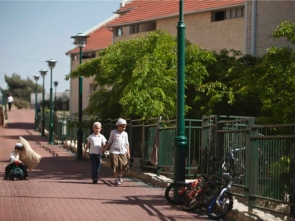EDITOR: The rule of law in Israel has never been weaker than now
With Israeli government refusing to follow its own Supreme Court rulings on the Migron and Ulpana Hill settlements, a new low has been reached in Israel. A year after the famous vacuous Tent Protest has exploded all over Israel, promising ‘a new democracy’ and more equal society, and avoiding totally any mention of the occupation, this new trough of Israeli political life is something to behold. Within a year, Netanyahu is the most popular politician in Israel, starting a new coalition government with Shaul Mofaz, who only two weeks ago, as he was making promises before being elected the Kadima party leader, has undertaken to continue as Opposition leader, and not to enter a coalition with Netanyahu. This victory of the lie and the criminal deed over law and democracy is emblematic, a sign of the deep and doomed state of the Israeli polis. It befits Netanyahu to preside over this final collapse of law, order and propriety. It is exactly where success for Netanyahu marks the total failure of Israeli political life, ina government which acts illegally, even in the face of its own legal system, not just the international law.
In surprise move, Netanyahu, Mofaz agree to form unity government, cancel early elections: Haaretz
PM, opposition leader reach dramatic late-night agreement to form national unity government, in which Kadima head Mofaz expected to be appointed deputy prime minister.
By Jonathan Lis and Ophir Bar-Zohar
Prime Minister Benjamin Netanyahu and opposition chairman MK Shaul Mofaz (Kadima) reached a surprise agreement early Tuesday morning to form a national unity government.

The move came as the Knesset was preparing to disperse for early elections, which were expected to be scheduled for September 4.
Under the agreement, Kadima will join Netanyahu’s government and commit to supporting its policies through the end of its term in late 2013. Mofaz is expected to be appointed deputy prime minister, as well as minister without portfolio.
Mofaz will also serve as a member of the security cabinet, and Kadima members will serve as chairmen of the Knesset foreign affairs and defense committees, the economics committee, and any others that are agreed upon by both sides.
Chairwoman of the Israel Labor Party, Shelly Yacimovich, will become opposition leader instead of Mofaz. The process is also likely to affect Yair Lapid’s new party, Yesh Atid – it will have to wait another year and a half for elections to the 19th Knesset.
In exchange, Netanyahu’s government will support Kadima’s proposal to replace the Tal Law, which enables ultra-Orthodox youth to defer national service.
The sides also agreed on instituting changes to Israel’s electoral system.

Yair Lapid responded to the move on Tuesday morning on his Facebook page. He described the formation of the unity government as “the old kind of politics” and “corrupt and ugly.”
“It is time to remove it from our lives,” he wrote, adding, “This is politics of chairs instead of principles… of the interests of the group instead of the whole nation. They think that now they will continue for some time, and that we will forget, but they are mistaken. This disgusting political alliance will bury all those involved.”
Shelly Yacimovich criticized the move, and calling it an alliance of cowards, and the most ridiculous zig-zag in Israel’s political history. She also said that the move represented an opportunity for the Israel Labor Party to lead the opposition.
Meretz head Zahava Gal-On expressed outrage over the surprise move, calling it a “mega-stinking maneuver by a prime minister who wants to avoid elections and a desperate opposition chairman facing a crash.”
“This is a disgrace to the Israeli parliament and a terrible message to the public, which is losing faith in the leadership of the state,” she added.
Shaul Mofaz was elected head of Kadima less than two weeks ago, when he defeated former party head Tzipi Livni in the party’s leadership primary.
In an interview with Haaretz ahead of the primary, Mofaz insisted that, if elected, he would not join a government led by Netanyahu.
“Kadima under my leadership will remain in the opposition. The current government represents all that is wrong with Israel, I believe. Why should we join it?” he said at the time.
Ulpana illegal outpost must be gone by July, Israeli government is warned: Guardian
Judges reject coalition’s plea for delay and set new deadline for demolition of unauthorised buildings on Palestinian land
Harriet Sherwood in Jerusalem

The Israeli government has been given a fresh deadline for the controversial demolition of a Jewish outpost built on private Palestinian land after the supreme court rejected its request to renege on an earlier commitment.
In a ruling that will be vehemently opposed by pro-settler parties and factions, the court said five apartment buildings in Ulpana, on the edge of the Beit El settlement in the West Bank, must be evacuated and demolished by 1 July.
The government had agreed to a 1 May deadline, a year after the court declared the buildings to be illegal under Israeli law. Under international law, all Israeli settlements in the West Bank are illegal.
But faced with stiff resistance from within the coalition, the government requested a delay to allow it to reconsider its policy on how to deal with illegal outposts in the West Bank. The issue had significant consequences involving “diplomatic, public and operational considerations,” the government petition said.
The court rejected the argument, saying it was important for the state to honour its commitments, and that revisiting the issue “may lead to difficult consequences”.
On Sunday, when hearing the petition, the judges were highly critical of the government’s stance. “When the state says it will do something, it never enters our heads that the thing won’t get done,” said one. Another said: “Exceptional requests are becoming the norm. That isn’t healthy, from either a legal or public standpoint.”
Michael Sfard, the lawyer representing the Palestinian landowners, said in response to the ruling: “The moment the state submitted its unprecedented request, this case became a broader struggle than that of the [Palestinian] petitioners alone, and became a struggle to preserve the basic norms of a regime based on the rule of law.”
But an Ulpana resident, Harel Cohen, said he was confident the buildings would not be razed. “This crazy plan to uproot a very nice neighbourhood is not reasonable and cannot be done,” he said. “We are speaking to the prime minister and the government, and we know they will find a way out.”
The scheduled demolitions of Ulpana and Migron – another outpost built on private land, which is due to be demolished by 1 August after a series of delays – are seen as a test of the government’s readiness to comply with Israeli law in the face of pressure from pro-settler groups, whose influence on government policy is growing.
Critics say they are also an indication of the likely scale of resistance to an Israeli-Palestinian agreement on borders that would require the removal of tens of thousands of settlers from the land of a future Palestinian state.
The government recently retrospectively authorised three other illegal outposts in a move that was sharply criticised by the US, UK, French, German, Danish and Jordanian governments, the European Union, the United Nations and the Palestinian Authority. There are about 100 unauthorised developments in the West Bank.
About 350,000 Israelis live in West Bank settlements and outposts, and a further 200,000 in East Jerusalem. The issue of settlements is seen by the Palestinians and the international community as the main impediment to a peace agreement.
Rejecting state request, High Court orders demolition of West Bank outpost to go forward: Haaretz
Justices criticize government for wishing to reopen closed cases over changed policy, adding that the state had not provided the kind of extraordinary circumstances that would force revisiting a court verdict.
By Tomer Zarchin
Rejecting a state appeal, the High Court of Justice ordered on Monday the demolition of illegally-built structures in the Ulpana neighborhood.

The ruling came after state appealed to the High Court on Friday, requesting it reconsider its ruling to evacuate the Ulpana neighborhood, part of the West Bank settlement of Beit El, and tear down the structures there, which were built on private Palestinian land.
That day, the state cited the difficult ramifications an evacuation is likely to have for Beit El residents.
On Sunday, during a hearing regarding the state’s request, the court criticized Israel for not fulfilling its legal commitment to demolish the outpost. Justice Uzi Fogelman said that “when the state claims it will do something, we do not imagine that it will not be done. There is respect between the branches.”
In the ruling issued Monday, Supreme Court President Ahser Grunis along with Fogelman and Justice Salim Joubran rejected the state’s request, saying the illegal Ulpana structures would have to be evacuated by July 1.
The justices wrote that it was especially important for the state to honor its obligations to the High Court, adding that, by “accepting the state’s position, according to which the need to revisit policy is a reason to reopen a finalized process, my lead to difficult consequences.”
“Policy, in its very nature, isn’t a static thing. Will the state request to review processes that ended in a verdict every time a policy is reconsidered!?” the court asked, adding that a change in policy was not a reason to divert from the finality of a verdict,” the justices added.
The justices went on to say that the “authority to reopen a finalized legal procedure, assuming that it exists, is reserved for unusual situations and extraordinary circumstances.”
“Those circumstances have not been presented in this case, even if it does raise difficult question of public and social policy,” they added.
The state had previously pledged in court to implement the demolition orders for the neighborhood buildings, but last month it asked for 90 days to reevaluate its policy on enforcing demolition orders for illegal buildings in the West Bank, as it takes into account strategic, public and operative considerations together.
According to legal experts, the government’s request represents a problematic move – breaking the accepted rules for the relationship between the executive and judicial branches – that would put the country in a difficult position.
High Court may have ruled against West Bank outpost, but the story isn’t over: Haaretz
While it looks like the High Court was defending the rule of law, woe unto a generation that needs the High Court to tell the government that it’s meant to obey its rulings.
By Aeyal Gross
In the printed version of Monday’s High Court of Justice decision reiterating the order to vacate Beit El’s Ulpana neighborhood, there’s something interesting about the punctuation: Two sentences end with both a question mark and an exclamation point, something rare, if not unprecedented, in a court document.
“Does the state, every time a new policy is considered, plan to ask the court to reopen proceedings that have ended in a ruling?!” wrote court President Justice Asher Dan Grunis, who also wondered, “What … would be the reason for providing the exceptional remedy of reopening a legal proceeding .. in which the state has committed to act in a certain fashion?!”
On the one hand, one must welcome the court’s decision to reject the request to reopen the hearing on Ulpana Hill, which reinforces not only the finality of court decisions but reinforces the basic principle of carrying them out.
On the other hand, if in the case of Migron, the fact that there had to be a petition to the High Court to enforce a previous court ruling demonstrated the degree to which the occupation tramples on equal rights and the rule of law, in the Ulpana case there’s been an even further slide down the slippery slope.
Here the High Court had to deal with a specific request from the state not to obey a ruling it received.
So while it looks like the High Court was defending the rule of law, woe unto a generation that needs the High Court to tell the government that it’s meant to obey its rulings. No wonder the High Court had to append exclamation points to its question marks.
But the biggest question mark of all still remains: Will the structures built on private Palestinian land near Beit El be demolished by July 1, the date the court set? Migron, don’t forget, is meant to be dismantled by August 1.
This means that on the eve of general elections, the government is going to have to twice demolish buildings and evacuate settlers from private Palestinian land. If the government would prefer not to obey these rulings for political reasons, there are three possible scenarios.
The first could be a horrific one, in which despite the High Court’s unequivocal rulings the government simply doesn’t implement them, in what would be a total trampling of the rule of law. A second possibility is that the government would seek more extensions from the High Court, though based on its recent rulings it isn’t likely the court will agree.
The third scenario is that in an effort to codify the theft, various elements will try to pass “High Court bypass” laws that would retroactively legalize those outposts built on private Palestinian land. In such an instance, the High Court would once again be called upon to decide if such laws are constitutional, or if they contravene the Basic Law: Human Dignity and Freedom.
At issue is not just the rule of law in its formal sense, which was at least defended this time, but also the substance of the rule of law, which continues to be crushed.
It’s clear that the violations of law in these cases and the efforts to avoid carrying out the court rulings stems from the fact that these lands belong to Palestinians, and in this context, as in many others, the government relates to Palestinian rights as negatable.
One must recall that the rulings on Migron and Ulpana Hill represent the tip of the iceberg of government land grabs in the territories. The Spiegel Report, which was prepared based on Civil Administration data and revealed by Haaretz three years ago, found that in more than 30 settlements there had been extensive construction of buildings and infrastructure on private Palestinian land in the West Bank.
Let’s not delude ourselves that the cases that have reached the High Court of Justice will solve the deeper, much more serious problem.